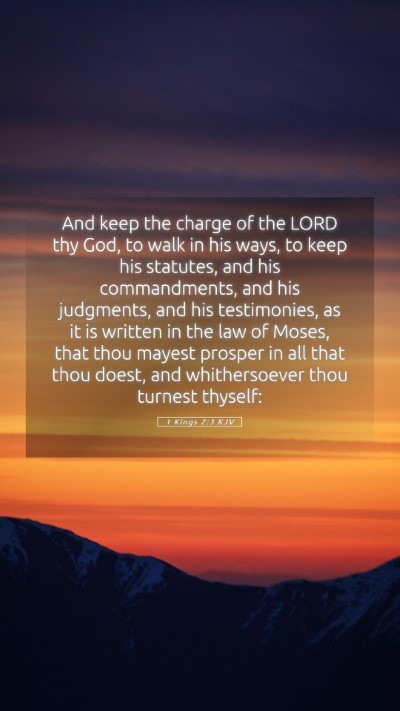Understanding 1 Kings 2:3
1 Kings 2:3 states:
"And keep the charge of the LORD thy God, to walk in his ways, to keep his statutes, and his commandments, and his judgments, and his testimonies, as it is written in the law of Moses, that thou mayest prosper in all that thou doest, and whithersoever thou turnest thyself."
This verse, rich in instruction and spiritual significance, encapsulates the essence of a faithful life according to God's commandments. Below, we delve deeper into its meanings through insights drawn from esteemed public domain commentaries.
Bible Verse Meanings and Interpretations
Matthew Henry's Commentary
Matthew Henry emphasizes the importance of obedience in maintaining a right relationship with God. He notes that David, in giving these instructions to his son Solomon, highlights that true prosperity comes from adhering to God's law. The call to "keep the charge of the LORD" signifies a lifelong commitment to God’s directives, which leads to divine favor.
Albert Barnes' Notes on the Bible
Albert Barnes points out that King David is urging Solomon not just to follow God's statutes but to internalize them. This indicates a deep-rooted understanding of God’s requirements, suggesting that a successful reign would hinge upon Solomon’s fidelity to God’s ways. Barnes elaborates on the themes of obedience and the resulting prosperity that ensues from a righteous life, as anchored in the law of Moses.
Adam Clarke's Commentary
Adam Clarke sheds light on the historical context of David's charge to Solomon. He insists that this counsel reflects David's own experiences with God’s faithfulness and the consequences of straying from His commands. Clarke highlights the notion that spiritual integrity must precede political leadership. The "judgments" and "testimonies" refer to specific aspects of God's law that guide ethical conduct, reinforcing the need for divine guidance in all endeavors.
Thematic Breakdown of 1 Kings 2:3
-
Charge of the LORD:
This phrase emphasizes responsibility in maintaining a covenant relationship with God. It reflects the importance of diligence and commitment in one’s spiritual walk.
-
Walk in His Ways:
This suggests not merely a physical path but a way of life that embodies God’s principles. It is a call to align one’s actions and decisions with divine wisdom.
-
Statutes and Commandments:
These terms encompass the moral and ceremonial laws of God, indicating that both personal and communal conduct must reflect divine expectations.
-
Prospers in All That Thou Doest:
This serves as a promise that following God will lead to success in endeavors, aligning one’s life with God’s purpose provides a pathway to fulfillment.
Application and Significance in Modern Life
1 Kings 2:3 continues to resonate today, serving as a valuable scriptural lesson for believers. It underscores the necessity of adherence to God’s commands for spiritual and practical success. As followers of Christ, applying the lessons from this verse can guide us in:
-
Daily Decision-Making:
Seeking counsel from Scripture can help in navigating personal and professional choices.
-
Building Character:
Embracing God's statutes can lead to a life marked by integrity and virtue.
-
Leadership Principles:
For those in positions of influence, understanding and embodying God’s laws creates a model for ethical leadership.
Bible Cross References
- Deuteronomy 6:5-7 – Love the Lord with all your heart and teach these commands diligently to your children.
- Psalm 119:105 – Your word is a lamp to my feet and a light to my path.
- Proverbs 3:1-6 – Trust in the Lord with all your heart and acknowledge Him in all your ways.
Conclusion
In summary, 1 Kings 2:3 serves not only as a historical admonition from a father to a son but as a timeless call to all believers for commitment to God’s way of life. The insights drawn from respected biblical commentaries enrich our understanding of this scripture, providing a roadmap for both individual lives and communal faith practices in our pursuit of living righteously. As you explore the Bible verse meanings and engage in Bible study insights, let this verse guide you towards a closer relationship with God and His commandments.


